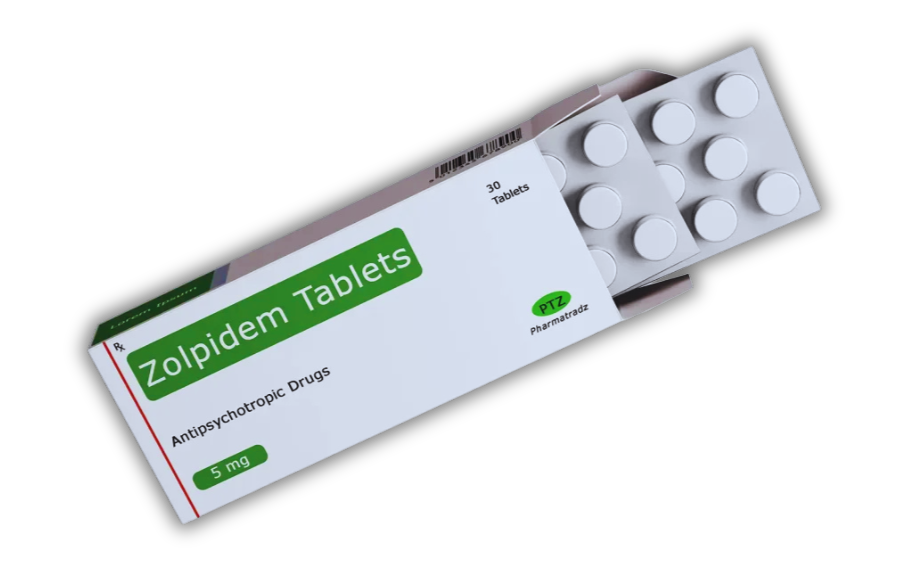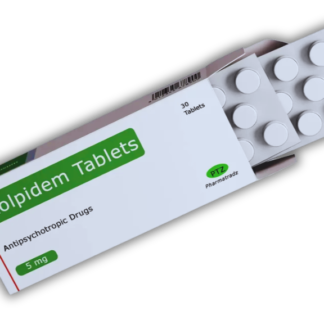Description
Zolpidem is a widely prescribed sleep medication and one of the most common treatments for insomnia in the UK. Recent research, though, points to troubling patterns of misuse and adverse effects that really deserve a closer look.
This non-benzodiazepine hypnotic started out as a supposedly safer alternative to older sleep drugs. But now, studies suggest many patients use zolpidem for months or years, even though guidelines recommend short-term use only.
More than half of zolpidem users report adverse effects like memory problems, sleepwalking, and even paradoxical insomnia. A large Brazilian study found 55.4% of users had side effects, with memory loss and sleepwalking among the most common complaints.
UK healthcare professionals are increasingly concerned about the risks when patients use zolpidem outside the guidelines.
Researchers keep digging into everything from optimal dosing and gender-specific recommendations to safer prescribing practices. Both healthcare providers and patients need to keep up with these new research themes as regulatory bodies re-examine zolpidem’s safety and how it’s prescribed.
Zolpidem Overview and Regulatory Status in the UK
Zolpidem is a controlled substance in the UK, grouped with other Z-drugs like zopiclone and zaleplon. It acts through selective GABA receptor modulation and falls under specific NICE prescribing guidelines.
Pharmacological Properties of Zolpidem
Zolpidem belongs to the imidazopyridine class of nonbenzodiazepine sedative-hypnotics. It acts as a selective agonist on GABA-A receptors, mainly targeting the alpha-1 subunit.
This selectivity brings on sedative effects with less disruption to sleep architecture. Unlike classic benzodiazepines, zolpidem tends to leave sleep stages and muscle relaxation relatively untouched.
It works fast, usually kicking in within 15-30 minutes. Its short half-life of about 2-3 hours makes it best for people who struggle to fall asleep rather than stay asleep.
Main pharmacological features:
- Strong selectivity for GABA-A receptor subtypes
- Minimal tolerance when used as directed
- Lower risk of physical dependence than benzodiazepines
- Preserves normal sleep stage patterns
Some recent studies have noticed paradoxical arousal effects in certain patients. For instance, people with disorders of consciousness sometimes show brief awakenings after taking zolpidem, but no one really knows why.
Legal Classification and Availability
Zolpidem is listed under the Misuse of Drugs Act 1971 as a controlled substance. As of April 2025, the GOV.UK controlled drugs list still includes zolpidem alongside other Z-drugs.
Patients need a prescription from a registered healthcare practitioner. Pharmacists must keep proper records for every zolpidem prescription they fill.
Travel regulations include:
- Personal licences for more than a three-month supply
- Required documentation for international travel
- Specific Home Office guidelines for patients travelling abroad
NHS prescription protocols follow NICE guidance, which limits treatment to 2-4 weeks at most. Private prescriptions are possible, but they have to meet the same controlled substance requirements. All prescribers must stick to Home Office rules for controlled drugs.
Recent Prescribing Trends and Research
NICE still recommends zolpidem for short-term insomnia, especially for trouble falling asleep. The focus is on evidence-based prescribing and picking patients carefully.
Prescribing trends show more awareness of dependence risks. Providers now use stricter monitoring for patients on Z-drugs.
Recent research includes:
- Studies on KCC2 receptor upregulation after chronic use
- Investigations into mGlu5 receptor changes with long-term treatment
- Analysis of increased dopamine release when combined with alcohol
Placebo-controlled studies have looked at zolpidem in neurological conditions. Some double-blind trials checked if it could help patients in vegetative or minimally conscious states.
UK prescribing data shows continued clinical use, even with tighter rules. Providers still see benefits for certain patients when they follow the guidelines.
Ongoing research aims to refine treatment protocols and reduce side effects. Current studies are looking at genetic factors that affect individual responses and the best dosing for specific groups.
Clinical Applications and Efficacy of Zolpidem
Zolpidem works well for insomnia but doesn’t do much for sleep issues in autism spectrum disorder or ADHD. Managing risks like side effects and dependency is crucial.
Primary Indications and Effectiveness
Zolpidem is the first-line treatment for insomnia disorder in the UK. Research shows it improves sleep outcomes compared to placebo.
Main benefits include:
- More total sleep time
- Shorter time to fall asleep
- Better sleep quality ratings
A meta-analysis of six randomised controlled trials with 1,068 patients confirmed zolpidem’s effectiveness for one-month courses. Patients got more sleep and fell asleep faster than those on placebo.
Zolpidem works similarly to benzodiazepines but with a different safety profile. In a study of 335 elderly patients, zolpidem 5mg matched the efficacy of temazepam 15mg over four weeks.
It’s especially useful for transient insomnia. In lab studies with 462 volunteers, zolpidem showed positive results on first-night sleep problems.
Treatment response rates stay pretty steady across different groups. Behavioural therapy and zolpidem offer similar response and remission rates, but zolpidem usually works faster in the first weeks.
Use in Special Populations: Autism and ADHD
There’s not much research on zolpidem for sleep issues in autism or ADHD. The evidence so far points to little benefit for the core symptoms of these conditions.
Zolpidem doesn’t tackle the underlying neurobiology behind autistic sleep disturbances. For many autistic people, sleep problems come from sensory processing differences and circadian rhythm issues that need more tailored approaches.
ADHD-related sleep issues often involve trouble falling asleep and frequent waking. Zolpidem might help with sleep latency, but it doesn’t address the hyperarousal common in ADHD.
Most research here focuses on behavioural interventions, not medications. Sleep hygiene and melatonin tend to work better for sleep problems in autism and ADHD.
Guidelines urge caution when prescribing zolpidem to people with neurodevelopmental conditions. These patients may be more sensitive to side effects and paradoxical reactions.
Safety Profile and Risk Management
Zolpidem brings several safety concerns that require close clinical oversight. Recent research has questioned earlier ideas about its safety compared to benzodiazepines.
Common side effects:
- Daytime drowsiness
- Dizziness
- Headache
- Memory problems
More serious risks include complex sleep behaviours like sleepwalking, sleep-related eating, and even sleep-driving. Neuroimaging studies have captured brain activity during these episodes.
Gender differences matter a lot for metabolism. Women clear zolpidem more slowly, leading to higher morning blood levels and a bigger risk of next-day impairment.
Dependency is a big concern. Long-term use can cause tolerance, pushing patients to increase their dose. Withdrawal symptoms are possible when stopping the medication.
Elderly patients face higher risks: falls, cognitive problems, and longer-lasting sedation. Oddly, there aren’t many randomised studies specifically on safety in older adults.
Providers need to weigh individual risks before prescribing and keep up regular monitoring throughout treatment.
Emerging Research Themes and Future Directions
Researchers are now exploring new uses for zolpidem, especially in neurodevelopmental conditions like autism and ADHD. They’re also testing innovative delivery methods and tracking long-term neuropsychiatric effects in ongoing studies.
Investigational Uses and Ongoing Studies
Some UK research teams are looking at whether zolpidem can help with sleep problems in autism spectrum disorders. Early studies are underway to see if it makes a difference for autistic people who struggle with sleep.
Several NHS centres are running clinical trials on zolpidem’s effects on cognitive function in ADHD patients. The focus is mostly on working memory and attention span.
A major research theme is its potential neuroprotective properties. Trials are investigating whether zolpidem can help treat certain brain injuries or coma states.
Multicentre studies are testing lower-dose forms for elderly patients. The goal is to cut down on morning drowsiness while keeping the benefits.
Researchers are also checking how zolpidem interacts with other sleep meds. This could lead to safer combination therapies for tough sleep disorders.
Potential Neuropsychiatric Implications
Long-term studies point to possible links between chronic zolpidem use and cognitive decline. Some data suggests users over 65 may have trouble forming new memories.
Scientists are exploring whether zolpidem affects autism-related behaviours. Early results hint at possible improvements in repetitive behaviours and social difficulties, but nothing is certain yet.
ADHD research is looking at how zolpidem impacts dopamine pathways. There’s interest in whether better sleep leads to improved attention and impulse control during the day.
Some data suggests zolpidem might affect neuroplasticity. Researchers want to know if this changes brain development in younger users.
Mental health effects are still being studied. There’s ongoing work into mood changes and dependency risks tied to long-term use.
Innovations in Treatment Approaches
Pharmaceutical companies are rolling out extended-release formulations for the UK. These aim to prevent waking up in the middle of the night without causing grogginess the next morning.
Personalised dosing is gaining ground. Genetic tests can help predict how quickly someone metabolises zolpidem, making it easier to find the right dose.
Digital health tools are catching on. Now, smartphone apps can track sleep quality for patients taking zolpidem.
New delivery systems like sublingual tablets and nasal sprays offer faster relief for severe insomnia. These methods are still under study but look promising.
Precision medicine is becoming more common, taking into account age, weight, and other meds to cut down on side effects and boost benefits.
Frequently Asked Questions
What are the recent advancements in Zolpidem’s clinical efficacy and safety for treating insomnia in the UK?
Recent meta-analyses with over 1,000 patients show zolpidem boosts total sleep time and helps people fall asleep faster when used for a month. It’s especially effective for elderly patients, with few side effects compared to placebo.
Studies find no big difference in adverse events between zolpidem and placebo after a month of use. Still, researchers say it’s important to consider how zolpidem affects sleep structure when planning treatment.
New options like sublingual tablets and oral sprays have come out, bypassing the gut and offering quicker relief for certain patients.
How has the latest research influenced changes in the prescribing guidelines of Zolpidem within the NHS?
The NHS still lists zolpidem as a short-term insomnia treatment and keeps it as a Class C controlled medicine. Guidelines stress the need for a thorough patient assessment before prescribing.
New safety data has reinforced the advice to monitor patients closely and stick to the prescribed dose. Providers should also consider non-drug alternatives along with zolpidem.
The National Institute for Health and Care Excellence keeps updating its guidance on controlled medicines like zolpidem. The latest guidelines reflect current evidence on who should get zolpidem and for how long.
What are the long-term implications of Zolpidem use according to recent studies conducted in the UK?
Recent research in the UK shows that zolpidem works well and stays safe for about a month of treatment. There’s not much solid data on what happens if people use it for longer than that.
Some studies point out that zolpidem can change the structure of sleep, especially if someone takes it for a long time. Experts suggest keeping an eye on sleep quality, using both how patients feel and what sleep studies show.
Zolpidem’s status as a controlled substance highlights real worries about people developing a dependency if they use it too long. Doctors need to weigh up the benefits and risks for each patient, which isn’t always straightforward.
How do current UK regulations address the potential for dependency and abuse associated with Zolpidem?
In the UK, zolpidem is a Class C controlled medicine. That means doctors have to stick to strict rules when prescribing it and keep a close watch on patients.
This classification tries to balance the risk of misuse with making sure people who need zolpidem can still get it. Prescribers have to review patients regularly and keep proper records—it’s not just a formality.
Ongoing research into side effects and misuse keeps shaping these regulations. These studies look at how people actually use the medicine and what might put them at risk for problems.
What are the findings from the latest UK-based comparative studies between Zolpidem and alternative hypnotic medications?
Researchers have found that zolpidem beats a placebo for several sleep measures. But, honestly, there aren’t many recent studies directly comparing it to other prescription sleeping pills.
Some people say over-the-counter sleep aids work just as well for them as prescription options like zolpidem. It really depends on the person and what they’ve tried before.
Right now, zolpidem seems to fit best as part of a bigger plan that might include non-drug strategies. The best approach comes down to each patient’s unique needs and their treatment background.
Are there any novel therapeutic strategies or pharmacological alternatives to Zolpidem emerging from recent research in the UK?
Researchers in the UK keep exploring better ways to deliver zolpidem. Sublingual tablets and oral sprays are popping up more often in studies.
The idea is to help people get the same benefits but with fewer hassles or risks. It’s a bit of a balancing act, honestly.
At the same time, non-drug approaches are grabbing more attention. People are talking about cognitive behavioural techniques and sleep hygiene as either alternatives or add-ons to zolpidem.
Pharmaceutical companies are also tinkering with new versions of familiar medications. They’re hoping these tweaks will suit specific groups better.
Most of the focus lands on boosting effectiveness and cutting down on side effects. It’s not a revolution, but it does feel like progress.




Reviews
There are no reviews yet.